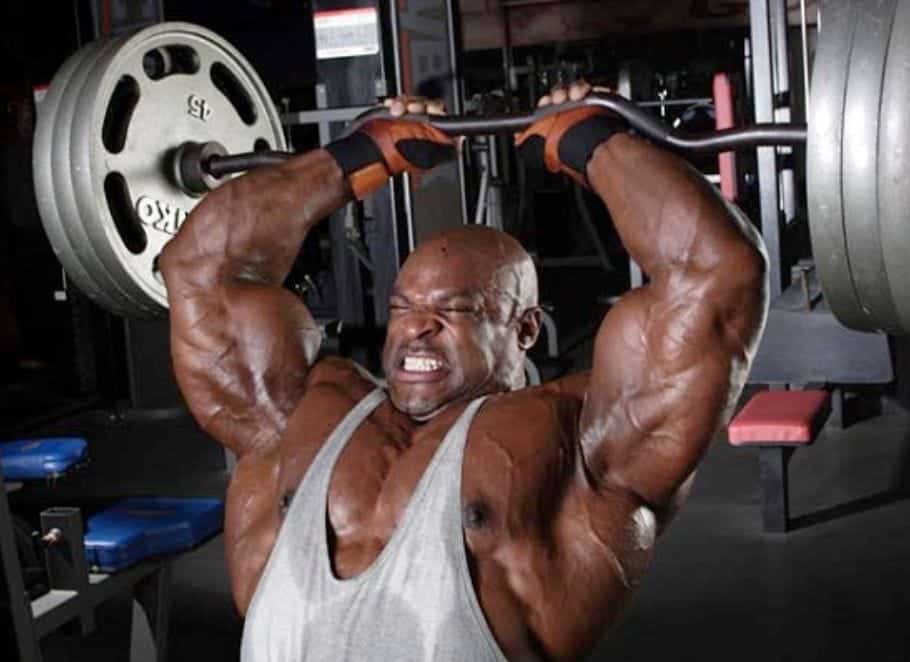Introduction
Do Bodybuilders Lift Heavy: Bodybuilding is not merely about aesthetics; it is a discipline rooted in the principles of physiology and exercise science. The art of sculpting the human body into a muscular masterpiece requires more than just dedication and sweat; it demands a deep understanding of how muscles respond to different forms of stress.
Lifting heavy weights is, without a doubt, one of the fundamental strategies employed by bodybuilders to induce muscle growth, a process known as hypertrophy. When you lift a heavy load, your muscles are forced to adapt to the increased resistance by recruiting more muscle fibers and enhancing their size and strength. This process is regulated by several physiological mechanisms, including the activation of satellite cells and the synthesis of muscle proteins. Moreover, heavy lifting stimulates the production of hormones like testosterone and growth hormone, which are crucial for muscle development.
These hormonal responses not only foster muscle growth but also contribute to overall strength gains, making it an essential element in the bodybuilder’s toolkit. However, it’s not a one-size-fits-all approach. The concept of “heavy” lifting varies from person to person and is relative to one’s individual fitness level. What might be heavy for a novice lifter could be considered a warm-up for an advanced bodybuilder. Therefore, personalized training plans tailored to an individual’s goals and capabilities are essential to harness the benefits of heavy lifting effectively.

Do bodybuilders have to lift heavy?
In fact, despite the widespread belief that muscles only grow after lifting heavy, you can and will build muscle just as effectively using lighter weights and higher reps.
Muscle Activation: Heavy lifting recruits a large number of muscle fibers, promoting maximum muscle activation. When you lift a heavy load, your body adapts by recruiting more muscle fibers to overcome the resistance. This leads to greater muscle engagement and, over time, muscle hypertrophy.
Hormone Release: Heavy lifting triggers the release of anabolic hormones, such as testosterone and growth hormone. These hormones play a crucial role in muscle growth, making heavy lifting an effective means of stimulating muscle development.
Strength Development: Lifting heavy weights is essential for building raw strength. This increased strength not only enables you to handle heavier weights but also improves your overall performance in the gym.
Metabolic Benefits: The intensity of heavy lifting can boost your metabolism, leading to increased calorie expenditure even after your workout. This can be advantageous for bodybuilders aiming to shed body fat while preserving muscle mass.
Do bodybuilders lift heavy or light?
On the intense end of the spectrum, powerlifters and many competitive bodybuilders pair very low reps (1 to 5) with extremely heavy weights (90-95% of their one-rep max).
Muscle Endurance: Lighter weights with higher repetitions (typically in the range of 50-70% 1RM) can enhance muscle endurance. This can be beneficial for bodybuilders aiming to improve their stamina during workouts or focus on muscle definition.
Reduced Injury Risk: Lifting lighter weights reduces the risk of injury, particularly for beginners or those with existing joint issues. It allows for better control of form and minimizes the strain on joints and connective tissues.
Variety and Muscle Confusion: Incorporating lighter weights into your training regimen can provide variety and help prevent plateaus. It keeps the muscles guessing and can be an effective strategy for muscle growth.
Rehabilitation: After an injury, bodybuilders often start with lighter weights during the rehabilitation process. It helps maintain muscle engagement while avoiding excessive strain on the injured area.
Are bodybuilders strong or just big?
Many bodybuilders are tremendously strong, although not as strong as the best powerlifters. If you train for strength, you’ll get bigger muscles as well. Strength training is not optimal for building muscle, though, so you likely won’t end up with the muscle mass of a bodybuilder.
Size as a Prerequisite: In bodybuilding, achieving a significant degree of muscle size is often considered a prerequisite for success. Larger muscle cross-sectional areas generally provide a greater potential for strength. Muscle size and strength are, to some extent, interrelated.
Strength Training: Bodybuilders engage in strength training as an integral part of their routines. They perform compound exercises, such as squats, deadlifts, and bench presses, which are known for their ability to build both muscle size and strength.
Periodization: Many bodybuilders incorporate phases of training that prioritize strength development. This involves lifting heavier weights with lower repetitions to increase maximal strength, alongside periods focused on hypertrophy to enhance muscle size.
Functional Strength: Bodybuilders may not always exhibit the same type of strength as powerlifters or Olympic weightlifters, who specialize in lifting extremely heavy weights for one repetition. Nevertheless, their strength is functional and well-suited for the demands of their sport, which includes performing various exercises with precision and control.
Is it OK if I dont lift heavy?
In fact, it would seem that you can lift surprisingly light and build both muscle size and strength in equal measure to those who lift heavy, which turns years of exercise science theory on its head. As it stands, you DON’T have to lift heavy to get bigger and stronger, and in some cases, you shouldn’t.
Reduced Risk of Injury: Lifting heavy weights can increase the risk of injury, particularly if proper form and technique are not maintained. Opting for lighter weights with higher repetitions can mitigate this risk, making your workouts safer.
Improved Muscular Endurance: Lighter weights with higher repetitions are an effective way to enhance muscular endurance. This can be especially beneficial for activities that require prolonged effort, such as long-distance running or functional fitness.
Toning and Definition: Lighter weights are often used in resistance training to target specific muscle groups and achieve muscle tone and definition without excessive muscle bulk. This approach is favored by individuals seeking a lean and sculpted physique.
Cardiovascular Benefits: Circuit training with lighter weights can provide cardiovascular benefits while still engaging muscles. This can contribute to improved heart health and overall fitness.
Variety and Reduced Plateaus: Incorporating lighter weights into your workout routine can add variety and prevent plateaus. Changing up your routine challenges your body in new ways, promoting continued progress.
Is it OK to not lift heavy?
In fact, going lighter than you think you should might end up making you stronger in the long run. “Resistance training to failure at lighter loads is a viable option for individuals who desire to get stronger, but do not enjoy lifting heavy or prefer a muscular endurance approach to training,” Dinyer said.
Reduced Risk of Injury: Heavy lifting, especially without proper form and technique, can increase the risk of injuries. Opting for lighter weights with higher repetitions can be a safer choice, particularly for beginners or those with previous injuries.
Enhanced Muscular Endurance: Lighter weights and higher repetitions are a proven approach for improving muscular endurance. This can be highly beneficial for activities that demand sustained effort, such as long-distance running or functional fitness.
Toning and Definition: Resistance training with lighter weights can target specific muscle groups, resulting in muscle tone and definition without significant muscle hypertrophy. This approach is favored by individuals seeking a lean and sculpted physique.
Cardiovascular Health: Circuit training with lighter weights can provide cardiovascular benefits while still engaging muscles. This contributes to better heart health and overall fitness.
Variety and Plateau Prevention: Including lighter weights in your fitness routine introduces variety, which helps prevent plateaus in progress. The constant challenge stimulates your body in new ways, facilitating continued improvement.
Did Arnold Schwarzenegger lift light weights?
“He was the strongest man in the world and became incredibly famous on multiple continents for his body. And he was known for doing 125 reps with very, very light dumbbells,” he wrote. “So if heavy weights makes you happy, go for it. But if little weights make you happy, you’ve got good company!
Progressive Overload: Schwarzenegger understood the importance of progressive overload in muscle growth. This principle involves consistently increasing the resistance or weight lifted over time to stimulate muscle development. He incorporated heavy lifting into his training to achieve this goal.
Variety: Arnold believed in the importance of varying his training routines to continuously challenge his muscles. This included both heavy lifting for strength and lighter weights with higher repetitions for muscle endurance and definition.
Isolation Exercises: Schwarzenegger was an advocate of isolation exercises, which involve targeting specific muscle groups using lighter weights to achieve maximum muscle engagement and definition. These exercises were crucial for sculpting his aesthetics.
Mind-Muscle Connection: Arnold emphasized the mind-muscle connection, a concept that involves consciously focusing on the contraction and movement of the targeted muscle during exercises. This technique allows for greater muscle recruitment and can be applied with lighter weights.
Volume Training: Arnold Schwarzenegger was known for his high-volume training, which included multiple sets and repetitions.
Do I need to lift heavy to get big?
It is a myth that one must lift more weight to bulk up. If you’re regular and patient with lighter weights, you can achieve similar results. It all comes down to two factors: the number of reps, and the way you perform them in order to achieve muscle fatigue.
Training Volume: Muscle growth can occur through high training volume, achieved by performing multiple sets and repetitions with moderate weights (around 60-70% 1RM). This approach can be particularly effective for individuals who prefer not to lift extremely heavy weights.
Time Under Tension: Manipulating the tempo of repetitions and increasing the time under tension can also stimulate muscle growth. Slowing down the eccentric (lowering) phase of an exercise can increase muscle stress without necessarily lifting heavy weights.
Muscle Fatigue: Muscle fatigue, regardless of the weight lifted, can lead to muscle growth. This can be achieved through techniques like drop sets, supersets, and high-repetition training.
Nutrition and Recovery: Proper nutrition and adequate rest are essential components of muscle growth. Ensuring that you consume enough calories and protein and allowing your muscles to recover adequately are crucial aspects of the process.
At what age should you stop lifting heavy?
If you are currently in your 50s or 60s and have been lifting weights for many years, then it is likely that you will be able to continue doing so for many years to come. However, if you are in your 70s or older or have not been lifting weights for very long, you may need to start considering stopping.
Physical Health: Your current physical health and medical history are critical factors in determining whether you should continue lifting heavy weights as you age. Individuals with underlying health conditions or joint problems may need to adjust their lifting routines or consult with healthcare professionals.
Experience Level: Your experience and familiarity with strength training play a significant role in determining whether you can continue lifting heavy weights safely. Experienced lifters are more likely to have the conditioning to handle heavier loads with proper form.
Fitness Goals: Your specific fitness goals should your decision. If you aim to maintain general health, functional strength, and mobility, you may not need to lift extremely heavy weights. However, if you have specific strength or athletic objectives, heavy lifting may remain a part of your routine.
Joint Health: Joint health becomes increasingly with age. It’s essential to be attentive to any signs of joint pain or discomfort during heavy lifting. If such issues arise, modifying your lifting routine or incorporating joint-friendly exercises may be necessary.
Recovery Capacity: As you age, your body’s ability to recover from intense workouts may diminish. It’s advisable to allow more time for recovery between heavy lifting sessions and to incorporate stretching and mobility work into your routine to reduce the risk of injury.

Conclusion
Heavy lifting remains an indispensable tool in the bodybuilder’s arsenal. The physiological mechanisms that underpin muscle hypertrophy, such as the recruitment of additional muscle fibers, the activation of satellite cells, and the synthesis of muscle proteins, are all stimulated by the challenge of lifting heavy weights. The release of hormones like testosterone and growth hormone during intense resistance training sessions contributes significantly to muscle development and overall strength gains.
It is crucial to emphasize that the definition of “heavy” lifting is subjective and varies from individual to individual. The concept of progressive overload, wherein one consistently increases the resistance over time, is at the heart of effective bodybuilding. Novice lifters may consider a certain weight heavy, while seasoned bodybuilders might view it as a warm-up. Therefore, tailored training plans that align with individual fitness levels and goals are essential for maximizing the benefits of heavy lifting.
Heavy lifting should not stand alone but rather complement a comprehensive training program. It should be integrated into a structured routine that includes adequate rest, nutrition, and recovery. Overtraining or pushing beyond one’s limits can lead to injuries and setbacks, undermining the very goals bodybuilders strive to achieve.


1 comment
Wow, wonderful weblog format! How lengthy have you been running a blog for?
you make running a blog look easy. The whole glance of your web site is fantastic, as neatly as the content material!
You can see similar here dobry sklep